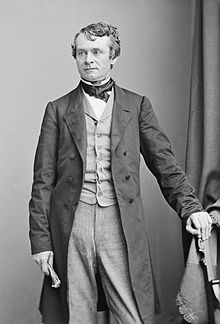Andrew Gregg Curtin
Andrew Gregg Curtin (born April 22, 1817 in Bellefonte , Center County , Pennsylvania , † October 7, 1894 ) was an American politician and from 1861 to 1867 the 15th governor of the state of Pennsylvania.
Early years and political advancement
Andrew Curtin, grandson of US Senator Andrew Gregg , attended Milton Elementary School and then Dickinson College until 1837 . After completing a law degree, he was admitted to the bar in 1839. Then he worked in his new job in a group practice in Bellefonte.
Curtin was at the beginning of his political career a member of the Whigs , for whom he belonged to the Electoral College in the presidential election of 1848 . He finally came to the Republican Party in 1860 through the Peoples Party . Under Governor James Pollock , Curtin became Secretary of the Commonwealth of Pennsylvania and Minister of Education in 1855 . In 1860, after some disputes with Simon Cameron and his supporters, he was elected as the candidate of the Republican Party as the new governor of his state.
Governor of Pennsylvania
Andrew Curtin took office on January 15, 1861. After being re-elected in 1864, he could remain in office until January 15, 1867. Most of his tenure was overshadowed by the events of the civil war that broke out in April 1861. Under Governor Curtin, Pennsylvania surpassed the troop contingent requested by the federal government. The surplus troops were then deployed to the defense of Washington, DC after the defeat at Bull Run . In Pennsylvania, as in all states of the Union, industrial production had to be converted to armaments requirements. Curtin not only supported President Abraham Lincoln with troops, but he made every effort to defend the slave emancipation acts in Pennsylvania.
In 1863 the war hit Pennsylvania. There it came to the bloody battle of Gettysburg in the first days of July . The victory of the Union troops in this battle, together with the simultaneous fall of the Confederate fortress Vicksburg in the state of Mississippi, marked the turn of the war in favor of the north. Governor Curtin was also the driving force behind the plan to establish a cemetery on the Gettysburg battlefield. He asked his friend Lincoln to attend the inauguration on November 19, 1863. He agreed and on that day gave his famous Gettysburg speech .
During his first term in office, Curtin suffered some stress-related breakdowns, so that he had to be represented at times. In his second term in office, economic production in Pennsylvania also had to be converted to civilian needs. The returning soldiers had to be reintegrated into society and the disabled had to be cared for. The governor had schools built for the orphans. The elimination of a transportation tax allowed the Pennsylvania Railroad to become the largest transportation company in the United States at the time.
Another résumé
After the end of his governorship, Curtin remained politically active. After an unsuccessful candidacy for the US Senate, he was appointed American ambassador to Russia by President Ulysses S. Grant . He held this post between 1869 and 1872. Because of his dissatisfaction with the corruption of the Grant government, he left his post and joined the Democratic Party . Between 1881 and 1887 he was a member of the US House of Representatives for his new party . There he was represented in several committees. Andrew Curtin died in October 1894. He was married to Catherine Irvine Wilson, with whom he had seven children.
Web links
- Andrew Gregg Curtin in the database of the National Governors Association (English)
- The governors of Pennsylvania (English)
- Andrew Gregg Curtin in the Biographical Directory of the United States Congress (English)
- Andrew Gregg Curtin in the database of Find a Grave (English)
| personal data | |
|---|---|
| SURNAME | Curtin, Andrew Gregg |
| BRIEF DESCRIPTION | American politician |
| DATE OF BIRTH | April 22, 1817 |
| PLACE OF BIRTH | Bellefonte , Pennsylvania |
| DATE OF DEATH | October 7, 1894 |
| Place of death | Bellefonte , Pennsylvania |

